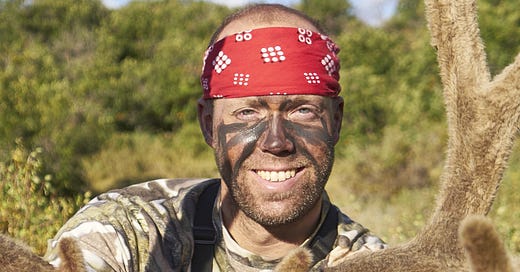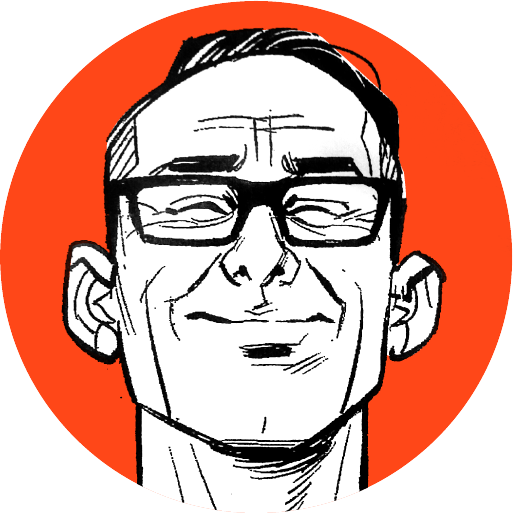Scratch a writer, and you’ll find an anthropologist and a sociologist
Recently I met up with my cousin Michelle, who’s funny and loud like her late mother. In fact, when we got together I said, “Mich, you’re nothing like your mom. Your mom was beautiful and young!” And in true Palahniuk fashion my cousin grabbed two butcher knives out of a knife block on a nearby kitchen counter and rushed forward as if to stab me to death. Which is exactly what my loud, funny Aunt Sophie would’ve done. That’s how we bond in my family. Insults and knife play.
As our first jobs, Mich and I had both worked at a truck-stop cafe called Francisco’s on the far edge of our small town.1 At age fourteen I washed dishes, and at age sixteen she waited tables. At our recent meet-up we talked about the cafe owners, Harry and Esther Francisco, and how Esther insisted I take all uneaten food off dirty plates and set it aside so she could place it on fresh plates for other diners. All celery sticks and bread rolls and whatnot might go out on three or four plates before someone would finally eat them. It was Kitchen Confidential forty years before Kitchen Confidential.
Michelle’s gross-out memories were of the legions of deer hunters returning from “the season.” For a week they’d roll in smelling like whiskey and campfire smoke and sweat. Bearded and jumping with fleas. Most would have a car or truck with a deer carcass roped across the hood, proof they’d bagged their trophy. Once I’d been told to carry a bucket of water out to a man whose radiator had overheated in the gravel parking lot. As I lugged the sloshing bucket to the hunter’s car, he clutched his belly and puked booze all over the hot engine. What a smell!
What struck Michelle and me this go-round was that hunting season was the circuit breaker that allowed so many men to go wild, get stinky, and kill something big. They were bloodied and exhausted and ready to go back to work at the pulp mill or on the railroad. And this sort of yearly ritual is exactly what the cultural anthropologist Victor Turner would describe as a “liminal ritual.” Such rituals perpetuate the culture by allowing people to go wild for a small period of time. The dirt and blood and violence keep them sane throughout their younger lives when they’ve too much energy to be working a day-to-day job. Instead of acting out in a bigger way—say, storming the US Capitol—they kill a deer and barf on their car’s hot engine. All good. It’s what men do.
I find this shit endlessly fascinating. In his memoirs, Frederick Douglass wrote about his time as a slave in antebellum America. The week between Christmas and New Year’s Day, Douglass called “Saturnalia.” During that time, slaves were given as much roasted pork and apple brandy as they could consume. They were allowed to travel and visit friends and family on other farms, where everyone was eating and drinking to excess. Douglass wrote that, as a very young man, he’d get so sick and bloated, so exhausted, that on January 1st he was happy to return to servitude. Like deer hunting, Saturnalia was the ritual that exhausted younger people so they’d happily return to the grinding status quo.
In his book Trickster Makes The World, Lewis Hyde writes about how the period before Lent served the same purpose. Call it Mardi Gras or Carnival or Fasching, it’s a few days of crazy. Hyde documents how Catholic clergy would ride in wagons through the streets throwing sausages and even feces at the jeering crowds. Normally pious folks were allowed to eat and even fornicate in the cathedrals. Everyone went bat shit so that once Lent began they’d be happy to return to life as serfs and peasants.
Hyde makes the interesting point that Martin Luther nailed his protest to the doors of Wittenberg Castle church during a similar liminal period of acting out—Halloween 1517. Halloween continues to be such a liminal ritual, when the powerless dress as outcasts—animals, cross-dressers, dead people, cowboys, witches, hobos—and demand tribute from property owners. If candy is not forthcoming, then property damage occurs. Hyde unpacks this all.
Among the Amish, the ritual is Rumspringa. Which translates to “running around,” and like Saturnalia it allows young members of the community to break all the rules. They live outside the community, do drugs, have sex, and in general exhaust themselves so much that they’re thrilled to return to the strictures of Amish life.
In the Cacophony Society, the liminal ritual was Santa Rampage or Burning Man. Cacophony created both, and for the festival’s first decade the participants were mainly people with tedious jobs. Portland Cacophony consisted mostly of mail carriers, so much so that their huge camp at Burning Man was called The Disgruntled Postal Workers Camp, where they all openly carried handguns and blasted away at various targets. Shooting guns was always a huge part of Burning Man. In fact like deer hunting the Cacophonists would rig a radio-controlled station wagon—think of a ’70s monster station wagon with fake wood-grain panels on the outside—then chase it across the desert playa and blast it with shotguns and rifles until it “died.” Then they’d fix their “prey” and go another round.
Historically, Burning Man also included the “Drive-By Shooting Gallery.” This consisted of huge stuffed animals tied to posts. They stood in a long row, and people drove past at high speed and tried to “kill” them. The entire week stunk of gunpowder.
It’s the same impulse: Get filthy, get intoxicated, kill something big. Then go back to the tedium of delivering the mail.
When the magazine Nest sent me to report on life aboard a nuclear submarine, I found shipboard life to be packed with such rituals. Officers would be compelled to do the jobs of enlisted personnel for short periods—say, serving them lavish meals, or scrubbing the toilets—all to preclude resentments and larger rebellions in such a contained world.
All of this came to mind as I talked to my cousin Michelle. At one point we both hit on the same memory and had to laugh. Our small town, Burbank, Washington, had always suffered a housing shortage. In the mid-’70s a huge new subdivision was platted, and our boss—Harry Francisco, whose office was wallpapered with smutty comics from Penthouse magazine—Harry advised Mich and me to buy up subdivision lots. They were selling for a few hundred bucks each, and Harry said we’d be rich if we could collect enough before the land rush.
Michelle and I laughed in his face. We needed our cash to buy cars, don’t you know. In hindsight, if we’d put down payments on enough land we’d have become wealthy before the age of eighteen, but we did not. Mich and I had to laugh about that one.
Now I make my living dreaming up liminal and liminoid games. Newly invented versions of Saturnalia and deer hunting. Only I called them Fight Clubs and Party Crashing. My most popular books propose and model such short-lived, structured, consensual rituals. People love those games. People need those games.
In closing, can you invent a game? Invent the right game, and you can change the entire world. As per Lewis Hyde, Protestant religions do not allow for a crazy time like Mardi Gras or Carnival or Fasching, exactly because they know it might allow for a huge popular uprising.
Revolution, if it comes, will come from what seems to be play time. Can you invent a game that people want to play? It will be a game that “fixes” the world.
In Denver today, washing my underpants in the bathroom sink. Ah, the glamour of a book tour. Wring the clothes in a bath towel, then iron them dry. If you meet me tomorrow at The Tattered Cover you can rest assured that I’m wearing clean underwear.
The place was long ago torn down so the two-lane highway could be widened. Sigh.








Chuck, I'm currently making my way through Not Forever (slowly so I can savor it). I'm fully aware of how cheesy this is going to sound, but I promise you I'm 100% sincere when I say it. This is one of those incredibly, incredibly rare books where as I'm reading it I'm already sad because I'll never again get to have the experience of reading it for the first time. It's that good. You really have outdone yourself with this one.
Just want to say great meeting you again in Pittsburgh! I did get my arm tattooed once I got back to Dayton Saturday! Next time I'll bring a sharpie!